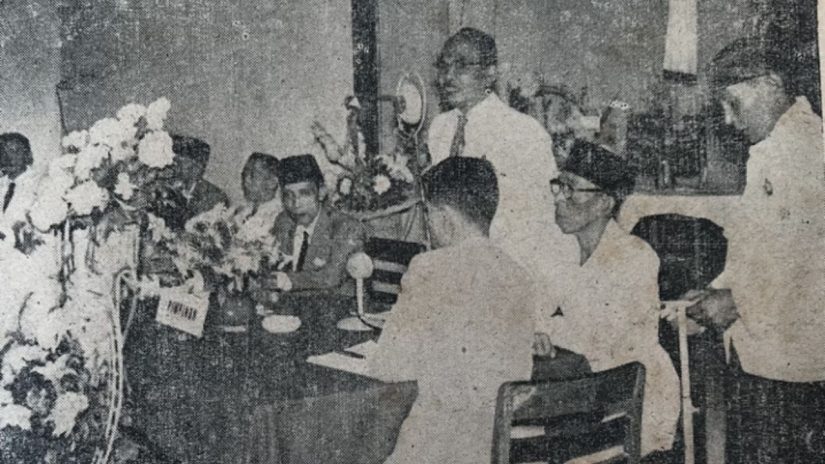
Johanes Koraag
Before world religions entered and spread their teachings in the Nusantara Region, some beliefs grew in every ethnic and subethnic community that existed. To this day, indigenous religions are still alive and thriving in various corners of Indonesia. At one time, there was a forced attempt by the government to make these indigenous religions sublimate and merge with world religions, but through persistence to maintain their identity, some persevered and continue to develop.
The existence of these indigenous religions of the archipelago disturbed the hearts of believers and leaders of these imported religions. They unilaterally define people who embrace these beliefs as “irreligious” because religious standards are used as indicators. Java, as an island with a population density that exceeds other islands and a history of civilization whose roots can be traced back several thousand years, gave birth to many belief systems that grew along with the development of its society. This Javanese belief system is more familiarly called the Kejawen stream (Javanism).
Religion and belief have long been the subject of political and academic debate among intellectuals studying religion and belief. Many books have been written related to the intertwining of religion and belief, mostly from the point of view of academics who study religions and want to explore the existence of the kebatinan movement and its development in modern Indonesia.
Eka Ningtyas, is a lecturer in the History faculty at Universitas Negeri Yogyakarta. Currently, she is a doctoral candidate in the Department of History, Society, and Civilization, Institute National des Langues et Civilization Orientales (INALCO) Paris. As a historian, she is working on the history of ideas in Indonesia during the modern era, especially in the formation of the notion of Javanism in the 19-20th centuries. Her doctoral research focuses on Javanism in modern Indonesia’s political-religious and literary discourse. She presented her research at the Wednesday Forum, October 25, 2023 held by CRCS and ICRS.
According to the data found by Ningtyas , in August 1955 for the first Indonesian Kebatinan Congress, 618 people from 47 organizations, gathered at Ashoka Building Semarang, to discuss mysticism or gerakan kebatinan to define the notion of kebatinan and understand it in the context of the principles contained in Pancasila as the ideology of the Indonesian nation. After the congress, the group that gathered in Semarang became known as Aliran Kebatinan.
For those who do not study Indonesian history, kebatinan is often regarded as a newly emerging modern phenomenon that has only recently become a topic of discussion among intellectuals even though this ‘kebatinan movement’ has an older age than the newly born Indonesian state in 1945. The movement’s name is derived from mystical practices that have developed in the Malay world since the end of the 19th century. This movement was characterized by an emphasis on spirituality. In her presentation, Ningtyas focused on the formation of religious discourses in the Indonesian Kebatinan Congress of 1955 as a response to the relationship between the state and society within the framework of religion as codified by the Pancasila. Her main concerns are the formation of the concept of kebatinan, the debates it raised, and the position of the kebatinan movement within the religious discourse in 1950s Indonesia. She argues that at this period, Indonesia’s religious discourse was fluid and loosely formalized. The progressive formalization process starting from this period can be analyzed through the formation of an umbrella organization for the kebatinan movement by some adherents who considered themselves as representing a brand different from mainstream religious institutions.
The struggle of the kebatinan movement to be able to exist as one of the Indigenous religions that was born and developed in Indonesia experienced great challenges because the Indonesian Government adopted a definition of religion based on indicators required by world religions such as Protestantism, Catholicism, and Islam. The religions of this world stipulate that a faith can be considered a religion if it has the basic things they have, namely worshiping one God, having scriptures, and a prophet as a messenger from God.
The occurrence of bloody violence in October 1965 caused the position of the kebatinan sect to be more cornered because some members of the BKKI (Badan Kongres Kebatinan Indonesia) were also members of the Indonesian Communist Party. In 1970, the leaders of the kebatinan movement were officially invited to join Golongan Karya by the government. Aliran Kebatinan was asked to change the name from kebatinan to kepercayaan (belief). In 1978, the New Order regime finally stressed that spiritual belief could be understood and treated as culture and should not conflict with the “official religions” of Indonesia. The government then transferred the affairs of spiritual beliefs from the Ministry of Religion to the Ministry of Culture.
Given the struggle of Aliran Kepercayaan, which has been struggling since the 1950s to obtain recognition and fair and equal treatment from the state, the government should have abandoned the colonial paradigm that placed Aliran Kepercayaan as a different entity from religion. This is a legacy of Dutch colonial colonialism that aims to divide the nation. The values espoused in religions are often different or at least interpreted differently. However, if you look at the history of the birth of religion, then religion is a form of belief in the existence of forces outside of humans, or God and His teachings. When viewed from the source of religious teachings, namely from God, then any religious teaching should be basically the same because the source is the same. These differences in values are not contradicted as much as possible but are mutually respected and harmonized. This is the duty of the Government as a regulator to regulate and provide the same rights and obligations to all existing beliefs in Indonesia.
